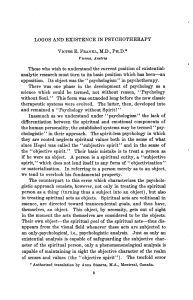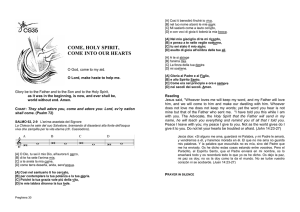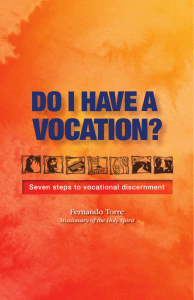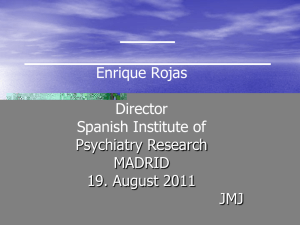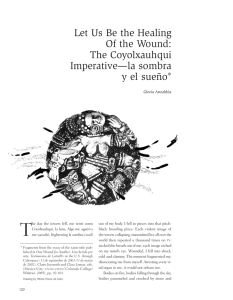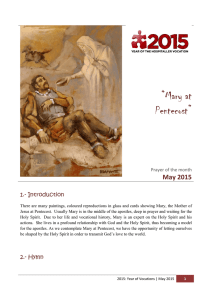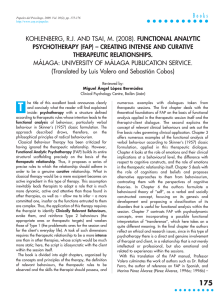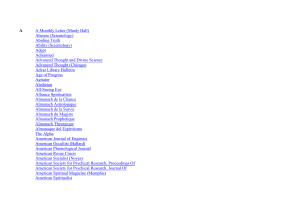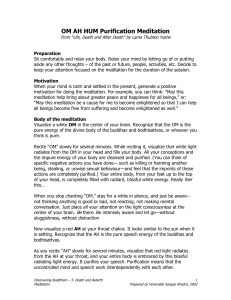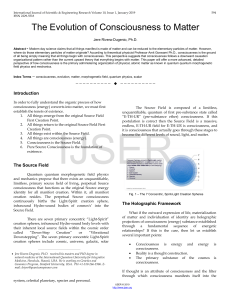An Education to Transcend Patriarchy
Anuncio
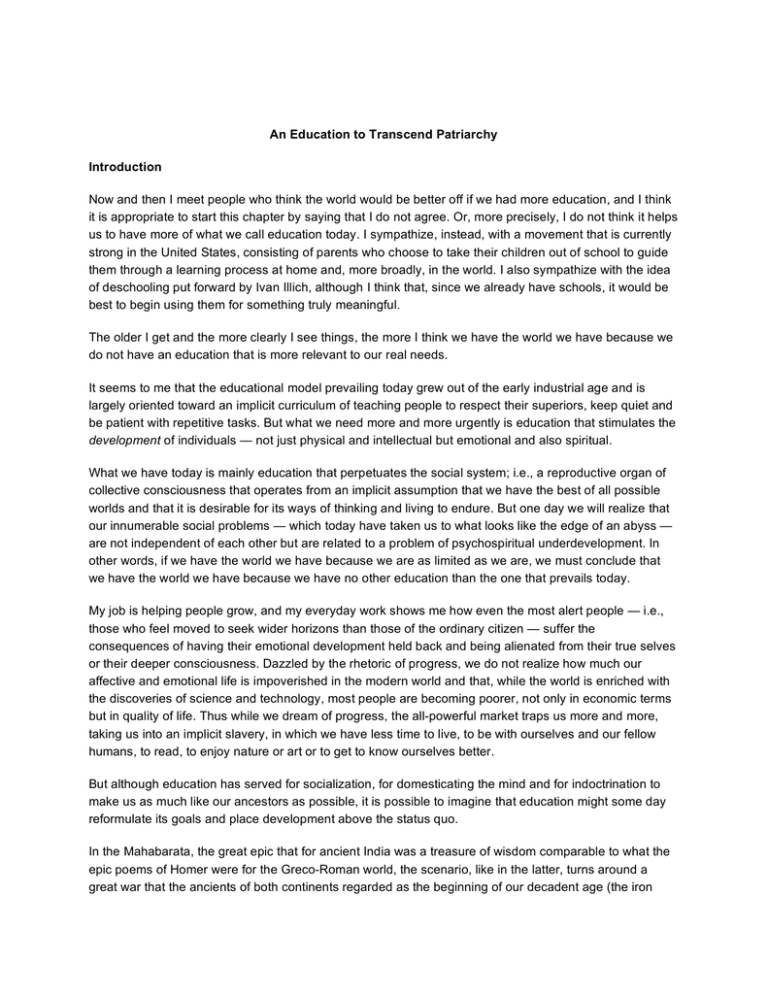
An Education to Transcend Patriarchy Introduction Now and then I meet people who think the world would be better off if we had more education, and I think it is appropriate to start this chapter by saying that I do not agree. Or, more precisely, I do not think it helps us to have more of what we call education today. I sympathize, instead, with a movement that is currently strong in the United States, consisting of parents who choose to take their children out of school to guide them through a learning process at home and, more broadly, in the world. I also sympathize with the idea of deschooling put forward by Ivan Illich, although I think that, since we already have schools, it would be best to begin using them for something truly meaningful. The older I get and the more clearly I see things, the more I think we have the world we have because we do not have an education that is more relevant to our real needs. It seems to me that the educational model prevailing today grew out of the early industrial age and is largely oriented toward an implicit curriculum of teaching people to respect their superiors, keep quiet and be patient with repetitive tasks. But what we need more and more urgently is education that stimulates the development of individuals — not just physical and intellectual but emotional and also spiritual. What we have today is mainly education that perpetuates the social system; i.e., a reproductive organ of collective consciousness that operates from an implicit assumption that we have the best of all possible worlds and that it is desirable for its ways of thinking and living to endure. But one day we will realize that our innumerable social problems — which today have taken us to what looks like the edge of an abyss — are not independent of each other but are related to a problem of psychospiritual underdevelopment. In other words, if we have the world we have because we are as limited as we are, we must conclude that we have the world we have because we have no other education than the one that prevails today. My job is helping people grow, and my everyday work shows me how even the most alert people — i.e., those who feel moved to seek wider horizons than those of the ordinary citizen — suffer the consequences of having their emotional development held back and being alienated from their true selves or their deeper consciousness. Dazzled by the rhetoric of progress, we do not realize how much our affective and emotional life is impoverished in the modern world and that, while the world is enriched with the discoveries of science and technology, most people are becoming poorer, not only in economic terms but in quality of life. Thus while we dream of progress, the all-powerful market traps us more and more, taking us into an implicit slavery, in which we have less time to live, to be with ourselves and our fellow humans, to read, to enjoy nature or art or to get to know ourselves better. But although education has served for socialization, for domesticating the mind and for indoctrination to make us as much like our ancestors as possible, it is possible to imagine that education might some day reformulate its goals and place development above the status quo. In the Mahabarata, the great epic that for ancient India was a treasure of wisdom comparable to what the epic poems of Homer were for the Greco-Roman world, the scenario, like in the latter, turns around a great war that the ancients of both continents regarded as the beginning of our decadent age (the iron age, or kali yuga). The origin of the two sides — the virtuous Pandavas and their enemies the Kauravas — is described in the following way: The Kauravas are the children of a blind king whose wife lovingly chooses to blindfold herself so she will not outshine her husband. In her abnegation she makes a wish for her children to be like him. As a result of this "loving wish," she gives birth to a metal sphere, which will be the origin of the hundred problematic siblings. However, the king who is the origin of the epic's virtuous Pandavas, whose name alludes to the color white, is not really their father. The story is similar to that of Joseph in the Bible. His two wives are visited and impregnated by several gods so that his children — reflections of the heavenly entities the wives have invoked — will become heroic or semi-divine. This seems to me a good metaphor for the great alternative we should bear in mind in the area of education. Wanting more of the same seems noble and patriotic, and we do not hesitate to consider it an expression of our love. But we are in a crisis of obsolescence, in which the persistence of the patriarchal and hegemonic spirit that has been with us since the beginning of civilization has become potentially deadly. Rather than wanting to continue with the same thing, it would be better to do something like those women who called on the gods, aspiring to something different and superior to what was known up to then. We may intuit that the answer to our innumerable ills is no longer within the reach of traditional politics, and that our hope lies now in the politics of consciousness--i.e.,the power arising from a shared understanding grounded in personal soundness. But how can we conceive of elevating, deepening or expanding peoples' consciousness on a mass scale except through education? Since my subject is an education to break away from patriarchy, I had best start by pointing out that we currently have not only a patriarchal society, but also a patriarchal education. In the light of the view of humans as three-brained beings in whose minds three "inner persons" interact, and their healthy condition as one in which an inner tyranny is replaced by a balance among the three components, it is clear that what we call education today is nothing but instruction, which is primarily concerned with transmitting information and not mental maturation. Complete education should be concerned with an interpersonal or affective aspect — what UNESCO calls "learning to live together"--and education that lhas the complete human being in mind should likewise take into account the mind's instinctive function, correcting the anti-instinctive attitude intrinsic to patriarchal society, that has been with us since the dawn of civilized life. In other words, education should be concerned not only with the ability of people to create healthy affective ties to each other, but should also cultivate freedom and take an interest in the happiness of the learners. But that is not all. Education must once again be concerned with that deep aspect of the mind on which the meaning of life and the harmony of our inner parts depends — which has traditionally been called "spirit." UNESCO has drawn attention to it, pointing out that it is not only important to learn to do, to learn and to live together, but also to be. In the following pages I intend to address the issue of what education could be — and had better be — once it assumes the higher objective of serving to make us better human beings and, in this way, also 1 serving the evolution of society. In my first approach to this subject I tried to draw attention to the wealth of resources that have been wasted up to now by the education offered or favored by the world's governments, as well as the need for that "education of an amphibian" that Aldous Huxley proposed in view of our multifaceted mind. I will concentrate here mainly on the aspects most eclipsed: - experiential knowledge of one's own mind, - the (mother-related)relational and the social aspects of life, -the (child-related) emancipatory aspect, - the spiritual. Needless to say, all these have been practically banished today from official curricula in spite of a widespread interest in cultivating "values." Cognitive gaps Edgar Morin has discussed so well the question of the learning that education should take into account that I will say little here apart from pointing out how much more important is understanding than mere information, and wisdom than mere knowledge. As Morin has already noted about our teaching and as so many others have said about Western culture and modernity, it is time we focused our aspiration to truth on the inner world and not only on knowledge of the outer world. Our "traditional education" (and civilization itself, for allowing it) is remarkably blind to the wisdom of perhaps the greatest pedagogue in Western history, that master of philosophers who not only knew the 2 wisdom of not being unaware of one's own ignorance but also the supreme art of maieutic dialog and who led his life according to the mandate, "know thyself," inscribed over the entrance to the Delphic oracle. We have built a great monument to Socrates in the cosmopolitan city of our modern mind, but up to now we have not done him the honor of taking him into account. It is only on the surface that education, limited to transmitting knowledge of the outer world, can appear to be rich. And the lack of attention to cultivating knowledge of the inner world is simply part of the complicity between education and a political and economic system that is better served by robotized, easily manipulated human beings. Knowing oneself is not studying psychology; it is a matter of life experience rather than thought. It begins with a lucid contact with our feelings and perceptions, progresses toward the knowledge of our emotions, includes the subtle consciousness of the thought process and can attain a transpersonal level that transcends the spheres of thinking, feeling and willing. It is a thirst for transcendence or truth that turns us into seekers until, like Oedipus, we solve the “enigma of the sphinx”. The oft-repeated oracular motto, "know thyself," encompasses two meanings. One, psychological, refers to contact with our immediate experience and the understanding of our personality, our unconscious motivations, our relations with others and our lives. But there is also a meaning that we may call spiritual, transpersonal, philosophical or mystical, which refers to the search for understanding our deepest nature-- 1 In "An Integral Education for a Unified World, in The End of Patriarchy. Amber Lotus, Berkeley, 1990. 2 Term related to midwifery, which came to be applied to someone who uses words to aid the psychic birth of others. that depth of consciousness we usually call "I," which is a sort of deeper identity beyond our psychological identity and likewise beyond conceptual definition. Both aspects of self-knowledge are worthy of emphasis in an educational undertaking. Nevertheless, both of them are notably missing from our institutionalized education. The ancients distinguished between the ideal of the minor mysteries (oriented toward the "true man") and the major mysteries (whose aim was the "complete" or "universal" man). Is it not time for the standard mandatory education of modern states to include in its curriculum an affective consciousness laboratory that might be a first step in a therapeutic process, and also an experiential exploration of the contemplative dimension? But I will come back later to the subject of spiritual education. Before closing this brief discussionon the need to expand cognitive horizons I only want to draw attention to how the shift from instruction to wholistic education will require an "ethics of economy" in regard to what the quintessential elements of our future universal scientific education will be. It is certainly not a question of badgering students with meaningless knowledge, drowning them in information just as in the "brave new world" prophetically described by Aldous Huxley people were drowned in amusement, advertising and drugs. Toward a Pedagogy of Love If we take seriously the UNESCO recommendation of ensuring that people learn (among other things) to live together, we should be aware that this is not something that will happen spontaneously through appropriate group or community interactions, but also requires the intention of healing people's emotional world. This is what underlies relations with others and the relationship of individuals with themselves. When I talk about healing our emotional world I mean recovering our natural capacity to love, which in turn involves unlearning destructive behavior patterns acquired in childhood in reaction to the psychological difficulties of families and setbacks in life. After many years of directing a school that has commonly been known, among other things, as a "school of love" and now begins to be concerned with education, people speak of my ‘pedagogy of love’. But since I work more with adults than young people and I have described my work in other books, I will only say here that much more is possible than we imagine, as long as we know how to combine certain little-known and neglected powerful resources. The above-mentioned experiential process of self-awareness, or self-knowledge, is one of the components of the affective transformation that is at the heart of psychotherapy. It is a sort of descent into hell and at the same time a process of purification — i.e., one in which the dysfunctional aspects of emotional life are deactivated through understanding. But self-awareness is not everything. There must also be a catharsis of repressed childhood emotions, which must not only be recalled but fully felt — i.e., experienced by diving deeply into them. And then, it is also necessary to unlearn the automatic or habitual behavior patterns through which we express our "negative emotions." There are plenty of resources available in the fields of psychotherapy and spirituality for educating the heart, as I have already mentioned in other books. But I think our ideal should not be merely to import resources into schools but rather a more complex assimilation: an novel integration into a new synthesis, or, if you will, a sufficiently thorough " technology transfer", so that it will not be necessary to use either the terminology or the visible formulas of either psychotherapy or traditional spiritual schools. The following example, taken from a book in which Rebecca Wild talks about her Pestalozzi school in Guayaquil, shows how a therapeutic endeavor does not require the form or language of psychotherapy: "For example, there was a little girl — small, chubby and very pampered — who did nothing in kindergarten for three months but sweep, scrub floors and wash dishes. One day her very distinguished, elegant father, with a very serious expression on his face, asked me, 'Could you tell me what you've done with my daughter here?' I had little experience and felt unsure — cornered, you might say — and I tried to give the gentleman a lesson in the Montessori method. But he shook his head and said he wasn't interested in that. "You see, he explained, 'before my daughter came here she didn't care about me at all, and now 3 she loves me. I just wanted to know how you did it.' " What had been done was nothing other than trusting in the child’s choices, and the anecdote tells us that what is basic for making such an educational action possible are not techniques or even specialized ideas but a vivid understanding of certain things; which, in turn, will require that teachers of the future may have gained therapeutic and spiritual experience and insight through first-hand immersion in such areas. I imagine, however, that, beyond the creativity of future teachers and together with the simple ideas put forward, it would be useful to create a therapeutic laboratory aiming specifically at fostering a more benevolent, compassionate and joyful generation than ours. I have used these three words in reference to the three loves, or the three facets of love, which, as I have suggested, are associated with our experience of our compassionate inner mother, our appreciative and ideal-seeking inner father and our joyful and joy-seeking inner child. If those who teach understood clearly how the expression of a person’s loving potential is a key to her happiness and a guarantee against the vampirism of the insatiable thirst for love that characterizes the degraded condition of consciousness, they would surely transmit this conviction and would do their students a great favor, getting them interested in the idea of a path of love; i.e., the idea that love is something that can be cultivated through practice. But even the best intentions about cultivating love encounter a major obstacle, and that is why the religion of love that has inspired our civilization has not been enough to get us out of barbarism. The main obstacles to love — or to our loves — are what are sometimes called negative or destructive emotions, and these are none other than what early Christianity designated as the cardinal sins, and what Hindu spirituality (in a less less criminalizing language) simply called "obstacles": pride, envy, anger, etc. Oscar 3 Raising Curious, Creative, Confident Kids; The Pestalozzi Experiment in Child-Based Education, Rebeca Wild, Shambhala 2000, pp 17 & 18. Ichazo’s protoanalysis, to which I have referred, calls them "passions," and I think the most precise term in our day would be "forms of deficiency motivation." Although the issue of purification or liberation of the soul chained by its sins is the same as the issue of liberation of the true self from its neurotic needs, these two languages are far removed from the current language of education, dominated by constructivism and behaviorism. I think therefore that we should draw attention to how the taboo of the therapeutic and the taboo of religion can be major obstacles to a truly effective pedagogy of love. The resistance of educators to psychotherapy is understandable, in view of the premature, exaggerated pretensions of psychoanalysis decades ago, and their resistance to religion is also understandable as a their reaction to the past hegemonic tendencies of the churches. But the therapeutic is one thing and professional psychotherapy is another, in the same way that religion and spiritual growth are not to be confused. Any therapy — particularly since Freud — involves looking at the past and plunging into past experiences, especially grief, aggression and frustrated desires. And why should education not be able to do the same in its own way? Furthermore, all therapy leads to love through making peace with the past, which entails understanding, compassion and forgiveness. In essence, this is what psychoanalysis proposed, but achieved rarely and at great cost. But if we want to give education something of the healing function that psychotherapy has been exploring up to now, we must start by acknowledging that healing wounded love and psychological insight, or self-awareness, are inseparable. By way of a brief reflection on self-awareness in a more universal context than that of psychotherapy, I would loke to briefly insert here a few remarks on Apollo, who, according to the Greeks, brought plagues and also demanded their purification. Apollo is the god of self-awareness and also of harmony, and we can say that the self-purification brought about by self-knowledge leads to harmony. Characteristic of Apollo are his precise, deadly arrows that destroy monsters, and we can decode this element of the myth to say that its essence is lucid perception: the prolongation of of the luminous god’s precise gaze. Does not awareness of the truth free us of our inner monsters more effectively than discipline or will-power? But the liberating consciousness of truth does not come about by self-observation only. It involves a gift of consciousness that is part of human relations, especially in relationships with therapeutic or spiritual guides. And there are also maps. Maps that sum up an illuminating vision and facilitate the organization of our perceptions of ourselves into an overall vision of our personality and our interpersonal relationships. "Teachings," in a word. One of these maps is the psychology of the Enneatypes, a body of knowledge that I developed (on the basis of an Asian Christian school in which it was an old oral tradition) and today promises to be as useful for educators as it has been for psychotherapists during the past several decades. It is also advisable for the knowledge we acquire about our life and relationships — and particularly about our difficulties — to guide our steps and motivate us to take corrective action. Better, however, is a broader experiential curriculum encompassing both the emotional domain and the instinctual; a curriculum supported by body psychotherapy and illuminated by a certain understanding of the process of healing and transformation, its obstacles and goals. For there is a very close relationship between the affective and the instinctual domains, and even though they constitute different spheres, their mutual relationship might be compared to that of the mother and the nursing infant. How could people who have recovered a healthy love toward themselves not be interested in the happiness of their inner child? Education for the Inner Child I would even say that for a cure of the heart to be fully effective, it is essential to undertake the cure of instinctiveness at the same time, bearing in mind the close relationship between the emotions and the body. This entails recognizing the great support that the set of resources commonly alluded to as bodywork, body psychotherapy or body therapies (which could be described as the inner or subtle aspect of sports) provides for the optimizing of emotional life. I do not feel it is necessary to go into detail here about the variety of ancient and modern disciplines, which range from yoga and tai-chi to eutony, the Feldenkrais work and the Río Abierto school. The interest shown by many people in the "inner game of tennis" and similar types of training is well known. Apart from the resulting competitive effectiveness, there is also an inner psychological and physical effect that comprises the development of a more functional, healthier attitude and enhanced body awareness, which is relevant to both emotional health and to the development of consciousness and even spiritual growth. But beyond the health of movement is also the health of that regulatory principle of action to which the word “instinct” makes reference. If the basic purpose of affective education is the development of people's potential to love — the key to good interpersonal relations — it is closely related to the healing of our instinctiveness, which is a process of liberation. Throughout the history of psychotherapy these two aspects of the healing of souls have been intertwined: the liberation of spontaneity and the awakening of love. They are parallel processes of optimization that operate in two different aspects of our Self. One is maternal and the other instinctive — both animal and child — oriented according to the pleasure principle and the free, creative search for happiness. I think it should be this way. For the development of love for one’s fellow-beings in a person can hardly be more than willful moral behavior if it cannot find support and be nurtured in a condition of caring for one's own inner child and it’s needs. Conversely, whoever heals the "vicissitudes" of instinctive life (with its aggression and unsatisfied love-thirst) finds a freedom, mental health and intimate satisfaction that spills over to others as warmth and empathy. I would mistrust an education that only proposed cultivating facets of love like solidarity and generosity without also taking as its task emancipation, but I think the spiritual power of religions weakened when, at the dawn of the patriarchal world, Dionysus was relegated to a marginal position in the pantheon of the Olympian gods. And I think that Nietzsche was right in saying that only Dionysian spirituality could save the petrified Christian civilization. In view of this I think today's convergenceof the Dionysian spirit with classical spirituality in transpersonal psychology is very promising, as is more generally the coming together of the yogic traditions of the East and the therapeutic culture — cradle of the rebirth of Dionysus in the contemporary world. Becoming healthy is not just the awareness of illness and its catharsis or exorcism through techniques of expression but is also the recovery of the intrinsic health of what we could call not only the inner child but the inner animal. This recovery is also a liberation from psycho-cultural impediments, which we may describe as an unlearning process, a getting rid of a sort of mental parasite (whose characteristics vary according to one's particular character neurosis). And what a change for the better it would be for our future educators to understand that health, like freedom itself, is not so much something acquired but something arrived at by breaking out of the prison of childhood conditionings in which everybody grows up without even knowing it until, on embarking on the adventure of self-awareness, they come to look beyond its walls! It does not matter if we talk about prison, illness, neurosis, sin, samsara or ego. What is important is to understand that the usual state of consciousness is a degraded or fragmented state of the psyche and a kind of dream. The "emotional plague" that Reich spoke of, which is handed down through the generations, is nothing other than the original sin that theologians of old attributed to genetic transmission and what today we can understand as cultural contagion. After the excesses of Puritanism and the sexual repression of the Judeo-Christian world, our culture is little inclined to speak of sin or even neurosis (as was customary in Freud's day). But I think it would be more than appropriate for educators to draw their students' attention to the universal myth of the hero who conquers the dragon, and even instill in them the spirit of a holy war against the inner monster that, like in fairy tales, holds the treasure of our existence in its claws. Would it not be a wonderful option for students to take an experiential course at each grade at school that would not only help them become conscious of the world of their emotions but also to transcend those negative emotions that the Christian tradition have been characterized as sins? 4 I think Eda LeShan was absolutely right when she wrote in the late 60s in Conspiracy Against Childhood: "Never before in history and nowhere else in the world has so much time, energy, attention and money been devoted to raising children as here in the U.S. Collectively as a nation, we invest billions of dollars every year in services for children. Individually as parents, we do not pay as much attention to anything as our own children's welfare. "There are more child specialists — teachers, psychologists, psychiatrists, social workers, pediatricians, pediatric nurses, counselors, school principals, recreation leaders and parent educators — who devote their lives to the welfare of children than in any other country in the world. Thousands of husbands and fathers spend three hours or more of their working day traveling between home and work so they can afford suburban schools and more space for them to play, while a similar number of wives and mothers are marginalized from the adult world while they guide their children from one 'important experience' to another, providing them with dance, music and art classes, Scout meetings, parties, puppet shows, taking them to museums and zoos, beaches, historic sites or picnics, swimming, sailing or tennis lessons, children's theater or the latest Walt Disney film. Our children have more toys, musical instruments, cars, boats, clothes, cassette recorders, radios, record players, records, books, bicycles, skis, surfboards, sleds, slides, TVs, typewriters, sewing machines, chemistry labs and games than children have ever had anywhere. 4 … "But in spite of all this and much more, who would want to be a child today? Not me. I think it is a terrible time for childhood. And if this is so in spite of how much we focus on it, we must be doing something wrong." The author then goes on to inform us about the rising yearly rate of child suicides, psychosomatic and psychiatric problems, behavior disorders and learning difficulties, and she wonders about the reason for the discrepancy between our intentions and results. She responds that our concern for children is not true attention to their reality and desires but something akin to seductive indulgence on the part of someone who needs to be forgiven. Actually, we are a pedophobic culture, and our supposed love of children masks our inability to be good parents. It is a sham that hides our limited capacity for love. With his theory of the Oedipal complex, Freud thought he had discovered the universal nature of parricide in people's secret mental life. I think the Argentinian psychoanalyst Pichon Rivière was no less right when he postulated some twenty or thirty years ago that infanticide is even further from consciousness but no less universal. Expressed in less implausible terms, we can say that parents harm their children much more than they suspect in their sleep-walking existence, without even knowing how they infect them with the pathology of society, in spite of their loving intentions. Pleasure is intrinsic to the inner child in everyone’s mind, as significantly revealed in the way Freud's Id was transformed over the years into Eric Berne's child (in the same way as the Superego was rebaptized by him as the critical father). It is obvious that patriarchal or traditional education, with its authoritarian (and even despotic) character, implants in us a disdain for pleasure that is perpetuated in society as a kind of psychic castration of its children. To the implicit but unequivocal criminalization of pleasure and disobedience is added the neglect of children's desires, which entails a covert message that children are not important, that in the end is internalized. This is surely a major component of our unhappiness, with the whole suite of complications deriving from it. Hence the importance of educational experiments in permissiveness, such as the excellent but much-maligned Summerhill experiment and those of the active school, in which a variety of inspirations converged. Rebecca Wild, quoted above, made an outstanding contribution in showing the therapeutic result of making a child feel that his/her preferences matter, and Steven Harrison has written an eloquent book, The Happy Child: Changing the Heart of Education, in which he argues for the primacy of happiness. On the first page of his introduction, he wonders whether the only thing education aspires to is the preparation of children for their role in society, and responds by saying: "This is certainly a good idea for society, but in the efficiency of producing citizen workers, are we not missing the deeper meaning and higher purpose of learning? Have we forgotten about the spirit of the child, the purpose of this one life, the unique and fragile expression of a passionate and integrated life?" And he announces: "This book is about a reorientation of education, a radical and fundamental realignment of the purpose of education. Can education shift from its current model of shaping children into components of economic production, and become an active experiment in optimizing the creativity of the whole child? We have been so busy educating our children that we have missed the heart of education, the creation of a happy life. A happy life, after all, is not only what we would like for our children, but for ourselves as well. "A happy person, fulfilled in her connection to her friends, family, and community and in the expression of her vocation, is likely to be useful and productive in her life and to help weave the collective fabric of a functional society. What else should a society need from education other than the happiness of its people? What else should we demand for our children other than their happiness?" The interest in the pleasure and joy of children naturally leads to an appreciation of their playful spirit because there is little that children like as much as playing. But I think it is important not only to draw attention to the importance of play in a child's development but also to point out the seriousness of its violation by patriarchal education, in which children are characteristically subjugated and made into instruments of market forces. Placing education at the service of the "absolute father" who represents the will of the State is intrinsically exploitative, and exploitation is the only way to describe the priority that schools give to passing exams and competing for grades, which puts a premium on vanity and strips learning of pleasure by ravaging the natural desire to learn. This bombardment with exams (a multimillion-dollar industry questionable for the lack of correlation between tests and later performance on the job) appeals to the concept of "quality" — taken from the industrial world. But it would be more worthwhile to understand that the quality that matters does not lie in passing exams but in fulfilling the more important objectives of education, such as creativity, the ability to establish satisfactory relationships with others and happiness. Another aspect of an education that would not only be concerned with transmitting knowledge and with providing the nurturance necessary to further the ability to love, and which took an interest in every student’s inner child, would be spontaneity — so inhibited by conventional education. The psychtherapeutic enterprise is largely a recovery of the spontaneity lost in childhood, and it goes without saying that in life not only control is important but also the ability to abandon control, so as to let oneself go. In other words, the capacity for surrender. All of this — valuing pleasure and the search for happiness, the playful spirit, spontaneity and surrender — are part of the Dionysian spirit, and more. More than pleasure, more than spontaneity and more than surrender or abandon (through which we can be in tune with the will of life itself), it involves trust in one's own nature. And it also involves freedom — the freedom that appears on the list of values that many educators proclaim as desirable but would be difficult to transmit for anybody who falls short of have succeeded in embodying it. Finally, the Dionysian spirit gives us the ability to disappear, to plunge into the mysterious dimension of life. For the future adult with a mystic vocation, this would be key to the "dying in God" that Christianity talks about and which crowns the spiritual thirst of seekers yet is so difficult to understand in contemporary society. Among the very important things that education not only neglects but barely mentions in its statement of goals and its curriculum (along with the capacity for presence or contact with one's own experiences), I want to draw attention to something that has been given various names. Fritz Perls called it "responsibility," giving the term a technical usage (common in existentialism) meaning "response-ability," (or the ability to respond) understanding it as not evading the truth of one's own experience. In other words, recognizing oneself as the author of one's own acts and words. From this derives the ability to encounter, in which a person is genuinely disposed to relate truly to another. In discussing the requirements of a good therapist, Rogers referred to the same thing when he somewhat euphemistically introduced the term "congruence," which describes the match or fit between feelings and actions. More simply put, perhaps, would be to speak of "being oneself"-- or authenticity. This is one of the ways in which the word "truth" is used — although today it has the more common connotation of agreement between certain statements and objective facts. We can no longer deny that unhappiness is an obstacle to performance on the job. Today even businesses are interested in human relations, and loving feelings like solidarity and fraternity are recognized as relevant to earnings. But I think people are unaware that authenticity is no less important in interpersonal relations, without which there is no suitable basis for love of one's fellow beings. I think it is fundamental to cultivate authenticity as the antidote to the falsification that is intrinsic to the neurotic mind and also to the cultural pathology that surrounds us. Without it, extolling values automatically becomes a stimulus to the fabrication of false ideals, an echo of the relationships that obedient, seductive children end up developing with their parents. No matter how much our culture has traditionally praised sincerity and honesty, I think that it is psychotherapy (together with art) that has contributed the most to their cultivation, planting in the world the seeds of independent thought, the capacity for intimacy and (at least) islands of community. But "being 5 6 oneself" does not go along very well with the "neo-Bidermeier" spirit in our day of Newspeak and the political correctness. Decades ago, Winnicott showed that we had to learn as children to be ourselves in the company of others, in the context of our early relationship with our mother. But he also noted that people rarely acquire that spontaneity in their relational lives. It would therefore be important, when considering the education of the future, that the "laboratory of human relations" I have been proposing (taking into account the observation of behavior and interpersonal relations as well as the task of optimizing them) should be guided not only by values like generosity and appreciation but also by values like sincerity, freedom and the courage to be oneself. As I come to the end of these disquisitions on the neglected emancipatory aspect of education, I want to draw the attention of my readers to how difficult it is in adult life to get rid of the education in self-rejection and lack of trust in ourselves that we have received at home and in school, and how tragically blind and ridiculous it is to purport being interested in the self-esteem of children without ceasing to castrate them psychologically through our institutional despotism. This in a supposedly democratic world which continues to deny children the freedom of expression the Constitution guarantees to adults when, in view of the needs of healthy development, it is children who need it most. 5 Bidermeier was the name given to the conventional post-Romantic culture that in Metternich's day followed the tempestuous period of the French Revolution and Napoleon. 6 Newspeak was the term used by Orwell in his fantasy of the future, 1984, for a language in which many words (like freedom or democracy) come to mean the opposite of what they had meant before. I earnestly hope, therefore, that tomorrow's educators will clearly understand that psychospiritual growth, without which it is not possible to be happy, not only entails self-acceptance but also an appreciation of the goodness of nature and the natural. Without this, two treasures that adorned the great civilizations before their decline — a sense of the beauty of life and gratitude for it — become unattainable. In his beautiful book, The Happy Child: Changing the Heart of Education, Steven Harrison says: "For those who see the child as born failed and broken, in need of repair and redirection, education will mean a revamping of the child, that is, into the child that should be. For the more sophisticated parent, the child, while not broken, needs the enlightenment of implanted values, specifically the parental values. "We are all adults who 'should be,' and we are never enough of whatever that is. We can easily implant this essential dissatisfaction in our children and induct them into the cult of unhappiness that looks to materialism for its solace. "But if we don't see children as broken at birth, then what are they if not a mystery?" I have suggested that honoring the inner child (our own or that of others) and letting it fly is a Dionysian thing in the same way that giving wings to the heart is a thing of the Great Mother (whatever one calls her). But I have talked much more about the emancipatory aspect of education because I feel that the idea is not only more novel but also more difficult. Insofar as cultivating love is consistent with all religious traditions, the Dionysian spirit runs counter to the patriarchal world's spirit of ascetic control. But I am convinced that this very conflict is the product of an implicitly hegemonic education, and that integral and ecumenic education that is the central theme of this book — one in which there is a balance between the merciful spirit (which Christian culture symbolizes in Mary), the libertarian Dionysian spirit and the peaceful, all-comprehending spirit of the Buddha--is not only possible but natural. While intellectual education implies teaching, and emotional education is not only learning but also unlearning, in education for spontaneity (and, in general, of the inner child, with its capacity for creative improvisation, which in turn involves learning to recognize one's own preferences and to express oneself) the element of unlearning is even greater. And it is here that the emancipatory aspect of education culminates. We can expect that if people are no longer slaves to the dead weight of the past, their unconscious regime of inner tyranny and their obsolete reactions, they may become citizens of a truly democratic world. To make such emancipatory education possible, I think that perhaps nothing is more important than turning from today’s current view of children as ignorant and uncivilized (that the patriarchal culture inspires in adults and even in teachers) into an attitude of true respect for their mystery — which means being open to learn from them. The spirit of traditional culture, which has been, rather, to teach them what they supposedly need to know to stop being ignorant little beasts devoid of culture, obviously has led to the perpetuation among educated people of the conviction that we are naturally imperfect, ignorant beings and we must acquire something from the experts that will make us feel complete. But I have always shared the intuition expressed so famously by Wordsworth that we come into this world from a condition of fulfillment, and that newborns already bring from their intrauterine existence that undifferentiated, objectless consciousness that is the goal of meditation, a consciousness that adults have lost and yearn for — recognizing it consciously or unconsciously as our fundamental condition and our true inner home. Perhaps we could have learned to move among the things of this world without losing that consciousness of simply being if the circumstances of our early life had not been so painful. But, no matter how much we may have forgotten it, we grew up in a world of much psychic pollution in which even those who loved us most in the end turned into transmitting agents of the toxic mindset of our sick society. I felt myself in good company when at the age of about 20 I read a letter by Dostoyevsky in which he expressed his conviction that children should always be told the truth. When I had a son years later I tried to do that, and found it a difficult challenge; I was never able to give him a satisfactory explanation for things in our life that, in the last instance, depended on social usages and political realities. I would say that my feeling that children should always be told the truth has been part of a tendency to see them as more innocent than adults and, in the last instance, a feeling that each child born into the world is something as pure as a flower starting to open. I think it would be very good if adults could see children not as underdeveloped adults but as unpolluted expressions of the divine. I think this is what some painters of old thought, and they expressed such intuition in their renderings of the recurring theme of the Nativity. Think, for example, of Botticelli, who so powerfully evokes the greatness of the small through his contrast of the tiny image of the child Jesus and the size of the crowd that, led by the emperor and the Pope, came to the manger. We have been taught to admire what is large, but not to discover the beauty of the small, or the wisdom hidden in the simple and the ordinary. We have learned to listen to the voice of authority in the exaltation of sermons, in the brilliance of speeches or in the vociferating enthusiasm of harangues. But if we want to raise beings capable of some day listening to that small voice through which the deity spoke to Elijah, we had better start listening to children. I think that in the midst of the breakdown of the civilization we have known, the increased interest felt by many adults in knowing themselves better is most helpful for children. But working against them is our limited capacity for love, our many neurotic needs and our exaggerated trust in what purports to be education but consists more of indoctrination than in support for the development of the mind. Even so, perhaps one of the most notable signs of progress in our decadent, problematic world is the consciousness of today's new children — so much more awakened than at the time of my own childhood. It may be that children (together with the new shamans and the truly wise) are our most valuable collective resource, and I say it in the hope that perceiving it will make it even more real. After talking about some of the cognitive, affective and conative aspects of what could be an education for the third millennium, it is now time to go into what UNESCO has alluded to with the notion of an education for being, which, as I have explained in connection with the ‘pyramidal model’ of the mind, I take to be the key to a balance among our three inner selves. The transpersonal and transcendent, or the "deep mind" Up to now I have talked about how schooling would do well to foster the maturation of affective and relational competences, healing the instinctive life and concerning itself with the relevance of the body as a support for psycho-spiritual development. Now it is time to turn to the most delicate theme of my proposal: the spiritual, which is the theme of Being or consciousness itself, beyond thinking, feeling and willing. I use the word "spiritual" tentatively in reference to a depth of the human mind that, according to the wisdom traditions, transcends the body and its emotions as well as the intellectual mind, and even our usual sense of identity — the ego, or the ‘little I’, of Eastern spirituality and modern transpersonal psychology. Alternatively, we may also speak of a transpersonal level of the mind and a "transpersonal education," as some people prefer, instead of resorting to the old term of "spiritual," which many regard as too discredited in the secular West. I have always shunned this alternative terminology, however, since I associate it with the strategic and political scientism of the American psychologists who founded the first transpersonal association, and I have usually preferred to speak of an “education for being”. But it is better not to complicate things too much with the use of words when we are looking at the relevance of something not unlike that ‘education for virtue’ (in which the Greeks coincided with the Roman moralists and the Christians who founded the first universities in Europe). And at this point I think that it is appropiate to point out how absurd is the much debated alternative between traditional religious education and lay education--as if these were the only possibilities. For I think that it is clear that a large part of the world has rejected the former alternative in view of the unpleasant after-taste left by the apologetic and propagandistic spirit of a Medieval Church with pretensions of hegemony, and I do not doubt that the same people would appreciate an alternative approach to the education of that deep part of consciousness that is the source of the meaning of life, the capacity for peace and the subtlety of attention. I think that, in spite of automatically and dogmatically equating "spirit" with the specific connotation of the term in Christianity in an age when many people see the latter as incompatible with their faith in science, it is not difficult in our day of cultural synthesis for educated people to agree that all religions have been paths toward something that approximates spiritual development, and their founders (i.e., the great religious geniuses of history), beyond their diverse languages and ways of symbolizing, have been giants of the ‘spirit’ beyond any particular religion. This is valid not only for the patriarchal religions of the civilized world, which have sacralized the transcendent in their intuition of a spirit beyond the visible world, but also for tribal, matriarchal and shamanic religions, which sacralized nature and perceived the spiritual as immanent in the cosmos and in human beings. We could go even further, like the Sufis, who say that their activity does not necessarily have to be recognized as spiritual. This clearly seems to be the case of many artists and thinkers also, whose spiritual stature is expressed through their art and words without necessarily being recognized as relevant to the limited or conventional notions of spirit currently in vogue. And furthermore, are there not people who are not even noted for their art or thinking, but for their way of being — people who by their virtuous absence of vanity become somehow invisible to the public in spite of the unusual development of their consciousness? Personally, I am convinced that there are people whose greatness consists only of their humanness — people who could be masters of humanness but have not chosen such a role and are not recognized as spiritual in spite of being a blessing to those close to them. I do not intend to philosophize about what spirit is, and much less seek to define it, for I do not see it as an indispensable prerequisite for formulating an education oriented toward the depth of the human mind. Although it is true that the rigorous intellect considers that something cannot be undertaken without first defining it, it is also true that in the great adventure of the spirit, rigorous intellect — i.e., rigid intellectualism — can be an impediment. 7 There is a story in Sufi culture attributed to Nasrudin which says that once while he was working as a boatman he was asked to take a grammarian to the opposite shore of a large river. The learned passenger noted the simple Nasrudin's errors of speech, and finally asked him if he had ever studied grammar. To Nasrudin's reply that he had not, the grammarian remarked, "But then you have lost half of your life!" After rowing a bit more Nasrudin asked his scholarly passenger if he had ever learned to swim, and when the latter informed him that he had not, Nasrudin said, "What a pity, for the boat has sprung a leak and you are about to lose your whole life!" Thus, we do not need a precise definition of "spirit" to realize, for example, that spiritual education cannot continue to be parochial — i.e., dogmatic and provincial. And in our high-technology age even the great classical religions seem somewhat provincial to us. Clearly, spiritual education should include a basic knowledge of religion, but it should be transnational, cross-cultural and trans-systemic, along the lines of what was proposed at the recent meetings of the World Parliament of Religions. Independently of what its core may be, a spiritual education of the future should include a presentation of the legacy of the great spiritual traditions of humankind, as well as the lives and thinking of their main representatives — not only Moses and Jesus Christ but also Buddha, Lao-Tze, Confucius, Mohammed, Padmasambhava and the Hindu teachers-- from the Vedic times of Vyasa to Ramakrishna and Ramana Maharishi in recent times. But this would be only preliminary instruction for a living spiritual education that is also ecumenical and integrative. Since we do not yet have this, it is obvious that it will have to be creative. But we can imagine that one reason why we do not have such an intercultural spiritual laboratory now has been the difficulty of creating it. It is conceivable to design an introductory course in the spiritual schools of different cultures based on a good compendium of data, but an experiential and integrative course in spirituality should be more than a potpourri of spiritual exercises. Rather, it should be a well-organized mosaic based on an accurate understanding of the traditions, methods, and issues underlying their exercises. It is not surprising, therefore, that no educator — as far as I know — has proposed such an integrative, cross-cultural spiritual education. Yet since for much of my life I have been an avid seeker who has always put his search before his professional activities, not only do I find myself in a position to try it, but I have already done it, although not for groups of schoolchildren, but for adults —for seekers, psychotherapists and teachers — as I will be describing in the next chapter. Before I finish the present chapter, however, I want to point out how the implementation of the supplementary curriculum I have just proposed, which is the sum of my proposals with regard to selfawareness, human relations and cultivation of the mind beyond the intellect, could only be conceived as something possible through a simplification of the traditional school curriculum. I trust that Edgar Morin's ideas about the priority of certain kinds of knowledge over mere information, in addition to audiovisual resources and computer and communication technology, will make it possible to cut down the number of hours currently devoted to a scientific curriculum. Only in this way students may ll have the time they need for a mainly experiential curriculum such as I propose, and teachers — freed of 7 … their overwhelming commitment to the role of repeaters and trainers of repeaters — can also have the time needed to assume a truly educational function. Naturally, the transformation of patriarchal education into transpersonal, integrative education will have to wait until the relevant authorities get over the still-prevailing taboo against therapeutic and spiritual elements in education. But it is easy to forsee that also the matter of financing the supplementary curriculum will be of paramount importance. Since today's teachers have neither the personal development nor the professional preparation to undertake the transformation of education, the project of revamping today's education will need to go through a stage of supplementing the education that teachers receive, through ongoing training either in universities or in the schools. And the slowness of the usual paths of maturation, in both the therapeutic and spiritual spheres, might lead us to imagine the need for extraordinary expenses. Here, once again — apart from the integration of spiritually relevant exercises — I think my input to psychospiritual work could be decisive. For my various contributions have crystallized into a way of working with groups that through the years has proven to be unusually effective and, furthermore, exceptionally brief--and thus economic. I have perfected these methods, under the name of the "SAT programs for personal and professional development," over the past thirty years of applying them in several European and Latin American countries, and to this I turn in the next chapter.
